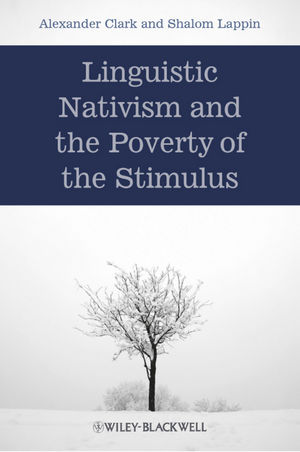Linguistic Nativism and the Poverty of the StimulusISBN: 978-1-4051-8784-8
Hardcover
264 pages
January 2011, Wiley-Blackwell
 |
||||||
“This book is not only very pertinent, but also succeeds in eschewing most of the polemical excess that tends to engulf us all in this field It’s not an easy book.. but I think it gives some sense of what the enterprise is about. Alex Clark describes it, at one point, as an exercise in clearing the ground – and it succeeds in sweeping away certain comfortable assumptions that are often made in this area, concerning (for instance) the irrelevance of negative evidence, what languages are provably unlearnable, and the role of the Chomsky hierarchy.” (New Books in Language, 8 June 2012)
“Most of all, it challenges basic concepts in mainstream linguistics. It rejects key tenets of UG in the light of advances in machine learning theory, and research in the computational modelling of the language acquisition process. It exposes so-called proofs supporting the poverty of stimulus, and reveals alternatives that are formally more comprehensive than the explanations previously provided by UG theories, and empirically more likely to match natural language acquisition processes.” (Linguist List, 2011)
“This book is not only very pertinent, but also succeeds in eschewing most of the polemical excess that tends to engulf us all in this field. It’s not an easy book … but I think it gives some sense of what the enterprise is about. Alex Clark describes it, at one point, as an exercise in clearing the ground – and it succeeds in sweeping away certain comfortable assumptions that are often made in this area, concerning (for instance) the irrelevance of negative evidence, what languages are provably unlearnable, and the role of the Chomsky hierarchy.” (New Books in Language, 2012 – review and interview available at http://newbooksinlanguage.com/2012/06/08/alexander-clark-and-shalom-lappin-linguistic-nativism-and-the-poverty-of-the-stimulus-wiley-blackwell-2011/)
This highly readable, but game-changing book shows to what extent the `poverty of the stimulus' argument stems from nothing more than poverty of the imagination. A must-read for generative linguists.
Ivan Sag, Stanford University
For fifty years, the "poverty of the stimulus" has driven
"nativist" linguistics. Clark and Lappin challenge the PoS
and develop a formal foundation for language learning. This
brilliant book should be mandatory reading for anyone who wants to
understand the most fundamental question in linguistics.
Richard Sproat, Oregon Health and Science
University
Clark and Lappin provide a brilliant and wide-ranging
re-examination of one of the most important questions in cognitive
science: how much innate structure is required to support language
acquisition. A remarkable achievement.
Nick Chater, Professor of Behavioural Science, University of
Warwick
This comprehensive cutting-edge treatise on linguistic nativism
skillfully untangles the human capacity to effortlessly learn
languages, from claims that this capacity is specific to
language.
Juliette Blevins, CUNY Graduate Center



